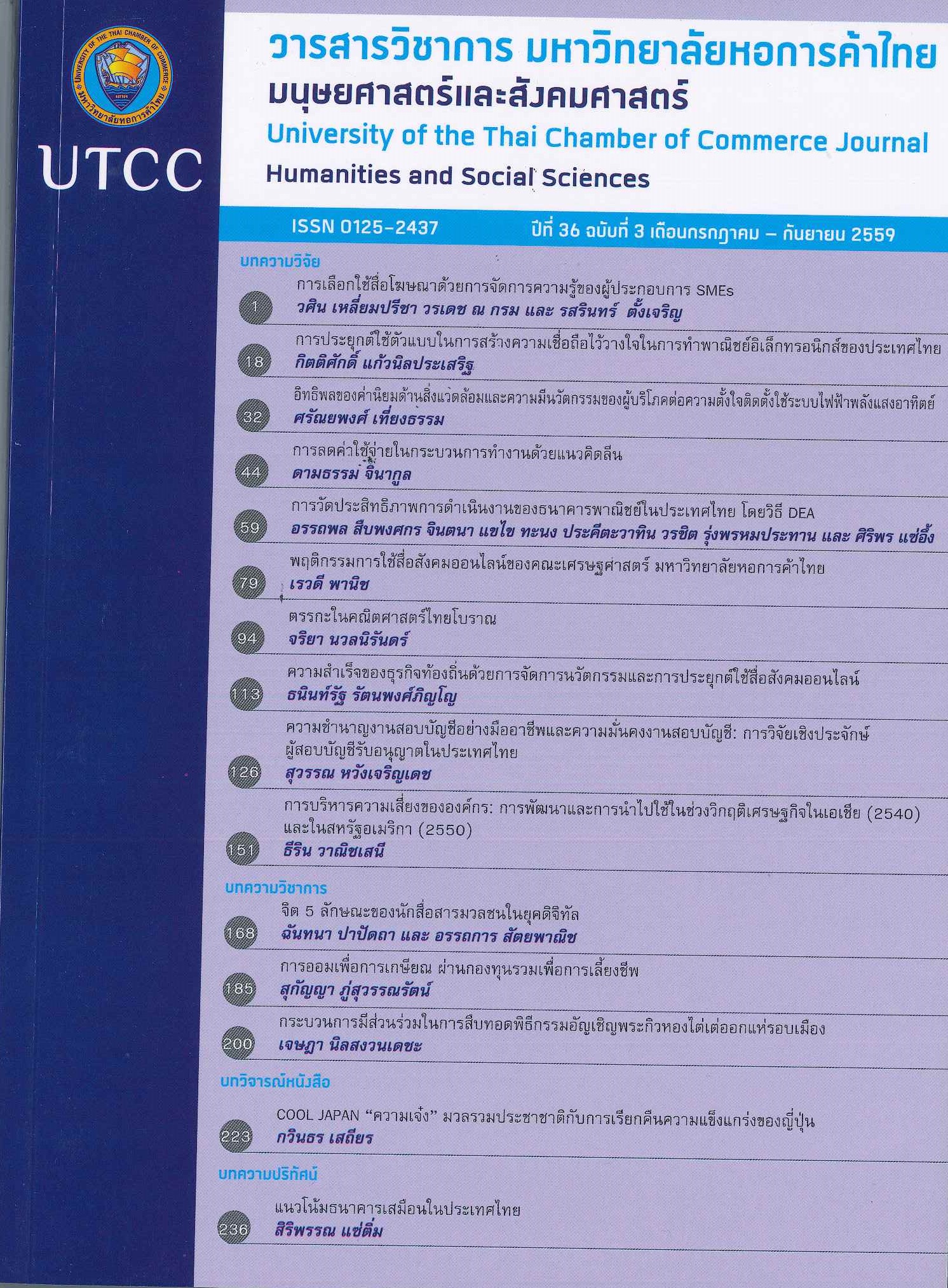Use of social media in the UTCC School of Economics
Main Article Content
Abstract
The objective of this paper was to study the behavior and satisfaction in using social media by professors and students in the UTCC School of Economics. The benefit of this study is a database to develop the learning outcome when using social media in learning and teaching in the classroom, designing classroom instruction and developing effective learning in the digital society. The hypothesis is that the behavior of professors and students using social media is consistent with the behavior of the Thai population. The study surveyed a sample of 230 students of economics Grades 1-4, and 27 lecturers in the first semester of the academic year in 2014 at UTCC. The results show that the behavior of professors and students using social media is consistent with the behavior of the Thai population and the level of satisfaction in using social media is good. The top-three popular channels include: Facebook, LINE, and You tube. Smartphones are used in connecting online social media via 3G/4G. The main purpose is to chat, to receive information and to entertain, respectively.
Article Details
ลิขสิทธิ์ของบทความ
ผลงานที่ได้รับการตีพิมพ์ถือเป็นลิขสิทธิ์ของมหาวิทยาลัยหอการค้าไทย ห้ามมิให้นำเนื้อหา ทัศนะ หรือข้อคิดเห็นใด ๆ ของผลงานไปทำซ้ำ ดัดแปลง หรือเผยแพร่ ไม่ว่าทั้งหมดหรือบางส่วนโดยไม่ได้รับอนุญาตเป็นลายลักษณ์อักษรจากมหาวิทยาลัยหอการค้าไทยก่อน
References
International Telecommunication Union (ITU). 2014. Indicators for the Information Society in 2557 [Online]. Available: https://www.techtvthailand.com/iut-survey-results-2014/ (in Thai).
สหภาพโทรคมนาคมระหว่างประเทศ(ไอทียู). 2557. ดัชนีชี้วัดสังคมสารสนเทศปี 2557 [ออนไลน์]. เข้าถึงจาก: https://www.techtvthailand.com/iut-survey-results-2014/
Krungwong, Kaewta. 2011. “Online Media: Contemporary Teaching.” University of the Thai Chamber of Commerce Journal 30, Special Issue: 368-380. (in Thai).
แก้วตา กรุงวงศ์. 2556. “สื่อออนไลน์: การสอนร่วมสมัย.” วารสารวิชาการมหาวิทยาลัยหอการค้าไทย 30, ฉบับพิเศษ: 368-380.
Nilpun, Marium. 1998. Behavioral and Social Sciences Research. 3rd ed. Bangkok: The project promotes the production of textbooks, Teaching documents Faculty of Education Silpakorn University. (in Thai).
มาเรียม นิลพันธุ์. 2551. วิธีวิจัยทางพฤติกรรมศาสตร์และสังคมศาสตร์. พิมพ์ครั้งที่ 3. กรุงเทพมหานคร: โครงการส่งเสริมการผลิตตำราและเอกสารการสอน คณะศึกษาศาสตร์ มหาวิทยาลัยศิลปากร.
Panich, Wijan. 2012. Way of Learning for Students in the 21st Century [Online]. Available: https://www.teenpath.net/download.asp?ID=2211 (in Thai).
วิจารณ์ พานิช. 2555. วิถีสร้างการเรียนรู้เพื่อศิษย์ในศตวรรษที่ 21 [ออนไลน์]. เข้าถึงจาก: https://www.teenpath.net/download.asp?ID=2211
Saba, Mehmood and Tarang, Taswir. 2013. “The Effects of Social Networking Sites on the Academic Performance of Students in College of Applied Sciences, Nizwa, Oman.” International Journal of Arts and Commerce 2, 1: 30–40.
Samkoset, Warakorn. 2014. Digital Economy Future to Prosperity [Online]. Available: https://www.nstda.or.th/news/19574-digital-smes (in Thai).
วรากรณ์ สามโกเศศ. 2557. Digital Economy Future to Prosperity [ออนไลน์]. เข้าถึงจาก: https://www.nstda.or.th/news/19574-digital-smes
Tamsak, Waneranus. 2014. Digital Economy: Learn to Understand and Apply [Online]. Available: https://bit.ly/1GgU107 (in Thai).
วนีรนุช ตามศักดิ์. 2557. Digital Economy: รู้ทัน เข้าใจ และนำไปใช้ [ออนไลน์]. เข้าถึงจาก: https://bit.ly/1GgU107
Thailand. Electronic Transactions Development Agency (Public Organization)(ETDA). 2014. Thailand Internet User Profile 2014 [Online]. Available: https://bit.ly/14Tuutz (in Thai).
สำนักงานพัฒนาธุรกรรมทางอิเล็กทรอนิกส์ (สพธอ.). 2557. Thailand Internet User Profile 2014 [ออนไลน์]. เข้าถึงจาก: https://bit.ly/14Tuutz
Thailand. Ministry of Information and Communication Technology, and Thammasat University Research and Consultancy Institute. 2014. (Draft) The Third Thailand Information and Communication Technology Master Plan 2014-2018 [Online]. Available: https://bit.ly/1JpflBu (in Thai).
กระทรวงเทคโนโลยีสารสนเทศและการสื่อสาร, มหาวิทยาลัยธรรมศาสตร์. สถาบันวิจัยและให้คำปรึกษา, และสวมธ.. 2557. แผนแม่บทเทคโนโลยีสารสนเทศและการสื่อสาร (ฉบับที่3) ของประเทศไทย พ.ศ.2557-2561 (ร่าง) [ออนไลน์]. เข้าถึงจาก: https://bit.ly/1JpflBu
Thailand. National Electronics and Computer Technology Center (NECTEC). 2014. Internet Users; How to be the Source of Information on the Internet [Online]. Available: https://bit.ly/1Ac6PUs (in Thai).
ศูนย์เทคโนโลยีอิเล็กทรอนิกส์และคอมพิวเตอร์แห่งชาติ(เนคเทค). 2557. Internet Users; วิธีการได้มาของข้อมูลผู้ใช้อินเทอร์เน็ต [ออนไลน์]. เข้าถึงจาก: https://bit.ly/1Ac6PUs
Yamane Taro. 1970. Statistic: An Introductory Analysis. Tokyo: Harper International Edition.
Zocial inc. 2014. Results Awards Thailand Zocial Awards 2014 [Online]. Available: https://bit.ly/1H9Y2PX. (in Thai).
โซเชียล อิงค์. 2557. สรุปผลรางวัล Thailand Zocial Awards 2014 [ออนไลน์]. เข้าถึงจาก: https://bit.ly/1H9Y2PX


